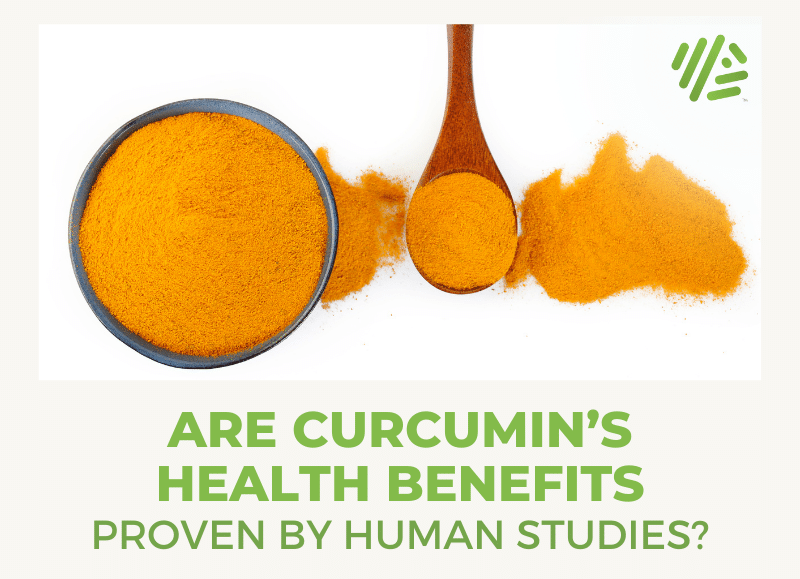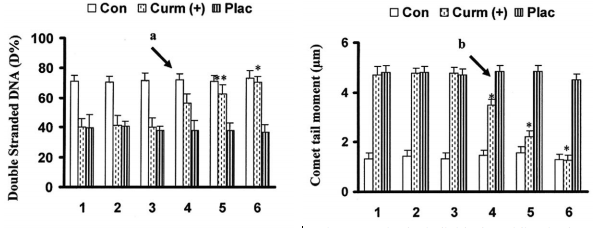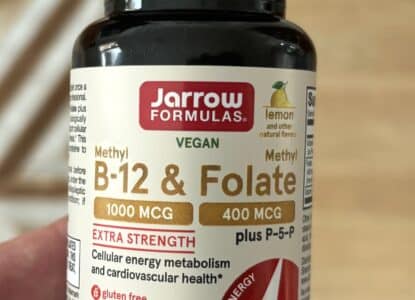Are Curcumin’s Health Benefits Proven by Human Studies?
Genes Mentioned

Contents
Benefits of turmeric and curcumin in human studies – strongest evidence
Many beneficial effects have been ascribed to curcumin, including in those with no existing health conditions 1 ; below we cover some areas where repeated studies have demonstrated a significant positive effect in those with chronic conditions. To give you the best insight into turmeric and curcumin I’ll run through some of the best quality human studies performed to date, and the various potential targets.Curcumin as an anti-inflammatory agent
A potent anti-inflammatory effect for curcumin has been described in several studies. 2 3 4 It remains unclear exactly how curcumin induces its anti-inflammatory response. Both inhibition of immune-cell activity and blocking of key inflammatory cell-signalling pathways, such as the NF-κB pathway, have been demonstrated. The exact mechanism of action in both instances has not been described and requires further research. This anti-inflammatory response links in with several disorders including irritable bowel syndrome (IBS) 5, the more severe inflammatory bowel disease (IBD) 6 (in conjunction with standard medication), osteoarthritis 7 and psoriasis. 8 In all instances patient outcomes were improved with significant reductions in inflammatory markers. However, as discussed above a mechanism to describe curcumin’s potent anti-inflammatory mechanism remains unknown.Curcumin and digestive health
Digestive disorders impose a significant health burden on individuals worldwide, ranging from the milder end of the spectrum and IBS (although sufferers are unlikely to class it as mild) through to the clinical disorders such as IBD and various ulcerous diseases such as ulcerative colitis. In the UK such digestive disorders were estimated to cost the national health service in excess of £8 billion (~$11 billion) in 1997, and these costs are only likely to have increased.In pre-clinical trials, turmeric demonstrated ability to protect the digestive system through its anti-inflammatory effects, and also by secreting enzymes to promote proper digestion, and overall digestive health. 9
In a randomized control trial (the best quality trial where individuals are randomized into treatment groups, and researchers are blinded to results) significantly more patients who received turmeric displayed reduced digestive disorder symptoms compared to patients in the placebo group. 10 Taking this further, another study investigated the activity of purified curcumin compared to two standard ulcerative colitis (UC) treatments. In this instance no difference in effect was observed as between the medication and curcumin, suggesting that curcumin is performing as well as current therapeutics. However, the authors reported a reduction in rate of relapse with curcumin users, a particularly important factor in disorders of the gut. 11 A further systematic review of all available studies reported a beneficial effect for curcumin as a co-therapy with established drugs in UC. 12 Figure adapted from Hanai et al. Curcumin Maintenance Therapy for Ulcerative Colitis: Randomized, Multicenter, Double-Blind, Placebo-Controlled Trial. Clinical Gastroenterology and Hepatology. 2006. The top line shows patients receiving curcumin remained in remission for longer, and to a greater extent than patients receiving a placebo.
Figure adapted from Hanai et al. Curcumin Maintenance Therapy for Ulcerative Colitis: Randomized, Multicenter, Double-Blind, Placebo-Controlled Trial. Clinical Gastroenterology and Hepatology. 2006. The top line shows patients receiving curcumin remained in remission for longer, and to a greater extent than patients receiving a placebo.
Curcumin for treating arthritis
A similar anti-inflammatory effect is hypothesized to describe the protective effect of curcumin in several studies investigating both rheumatoid and osteoarthritis. Arthritis is a disorder affecting the joints often associated with chronic pain and reduction in motility, the incidence of both is increasing significantly due to increases in lifespan and changes in lifestyle. In both rheumatoid, which is an autoimmune disorder, and osteoarthritis, which is associated with long term mechanical damage; an inflammatory environment in the joint leads to the breakdown of both cartilage and bone, giving rise to the disease symptoms. Other members of the ginger family have traditionally been used as medicines for arthritis, inhibiting inflammation 13 and leading to reductions in reported pain, 14 but with little effect on actual disease progression. Therefore investigating turmeric and curcumin was of obvious interest.Arthritis study – curcumin performed on par with standard drug therapy
A study on rheumatoid arthritis demonstrated a beneficial effect following treatment with 500 mg/day of curcumin with or without a standard anti-inflammatory drug (diclofenac sodium). Curcumin performed as well as the standard therapy alone, and significant improvements were observed following co-treatment. 15 Figure adapted from Chandran et al. A randomized, pilot study to assess the efficacy and safety of curcumin in patients with active rheumatoid arthritis. Phytother Research. 2012. Disease activity score was improved in all instances, with a slightly better response seen for curcumin and curcumin + standard therapy. Disease activity measures not just pain, but also motility so improvements can be functional as well, although the authors do not specify an effect.
Again, another systematic review has been performed, and in this instance the authors state that a dose of approximately 1000 mg/day of curcumin was effective in the treatment of arthritis. 16
It should be noted that this dose was recommended for those currently suffering with severe arthritis and was delivered under the supervision of medical personnel. While below the maximum levels observed in some studies, starting supplementation at a lower dose to check tolerance is always to be recommended.
Figure adapted from Chandran et al. A randomized, pilot study to assess the efficacy and safety of curcumin in patients with active rheumatoid arthritis. Phytother Research. 2012. Disease activity score was improved in all instances, with a slightly better response seen for curcumin and curcumin + standard therapy. Disease activity measures not just pain, but also motility so improvements can be functional as well, although the authors do not specify an effect.
Again, another systematic review has been performed, and in this instance the authors state that a dose of approximately 1000 mg/day of curcumin was effective in the treatment of arthritis. 16
It should be noted that this dose was recommended for those currently suffering with severe arthritis and was delivered under the supervision of medical personnel. While below the maximum levels observed in some studies, starting supplementation at a lower dose to check tolerance is always to be recommended.
Curcumin’s anti-oxidative properties
Another major positive aspect of curcumin is its anti-oxidative capacity. Oxidising agents generated in the body, or ingested, can rapidly induce cellular and genetic damage with lasting impacts. The body maintains anti-oxidative pathways, however in some individuals these pathways can demonstrate reduced activity, or due to chronic exposure to environmental oxidising agents (heavy metals, some pesticides and herbicides) these systems can become overwhelmed. Curcumin has been shown to increase total anti-oxidant activity in both healthy individuals 17 and in those with a chronic environmental exposure, as in the following study performed in a population exposed to environmental arsenic. 18 Figure adapted from Biswas et al. Curcumin protects DNA damage in a chronically arsenic-exposed population of West Bengal. Human & Experimental Toxicology. 2010. In the first figure treatment with curcumin was initiated at point a) following three months exposure to arsenic. The occurrence of doubled stranded DNA, a measure of DNA breakdown, was reduced suggesting DNA was being protected from oxidative damage. A similar effect was seen in a confirmatory experiment.
In animal and human cell studies curcumin has been shown to both increase the expression and activity of key anti-oxidant enzymes. However, and in contrast to the positive effects observed in inflammatory disorders, confirmatory clinical trials have not yet been reported.
Figure adapted from Biswas et al. Curcumin protects DNA damage in a chronically arsenic-exposed population of West Bengal. Human & Experimental Toxicology. 2010. In the first figure treatment with curcumin was initiated at point a) following three months exposure to arsenic. The occurrence of doubled stranded DNA, a measure of DNA breakdown, was reduced suggesting DNA was being protected from oxidative damage. A similar effect was seen in a confirmatory experiment.
In animal and human cell studies curcumin has been shown to both increase the expression and activity of key anti-oxidant enzymes. However, and in contrast to the positive effects observed in inflammatory disorders, confirmatory clinical trials have not yet been reported.




Thank you for a good overview of curcumin!
Some evidence that it performs as well as Prozac for depression?
Also beneficial for neurodegenerative disorders? Neuropathic pain?
So much territory to cover!
are you forgetting curcumin is full of oxalates ? kidney stone anyone ?